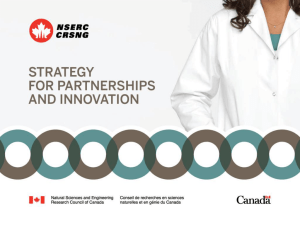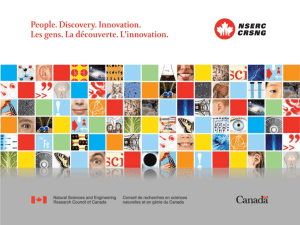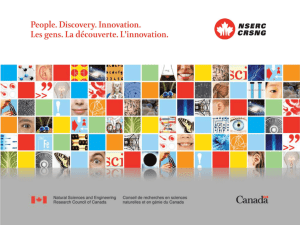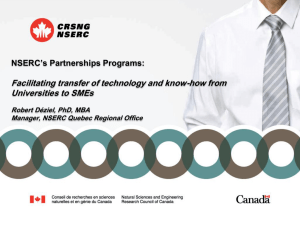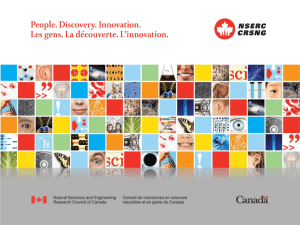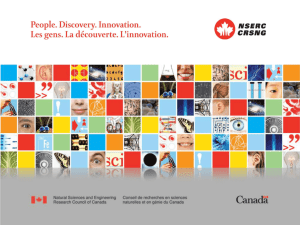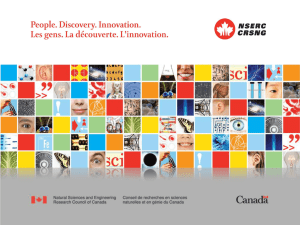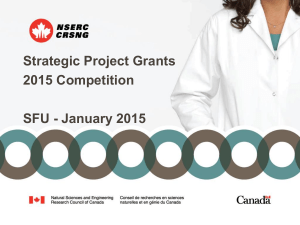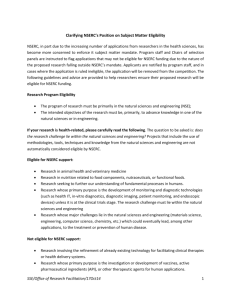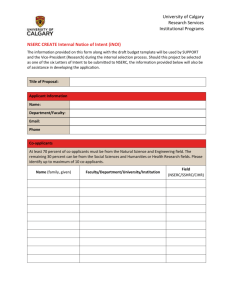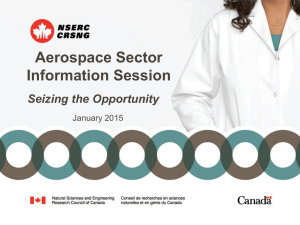Engage Plus Grants - University of Calgary
advertisement
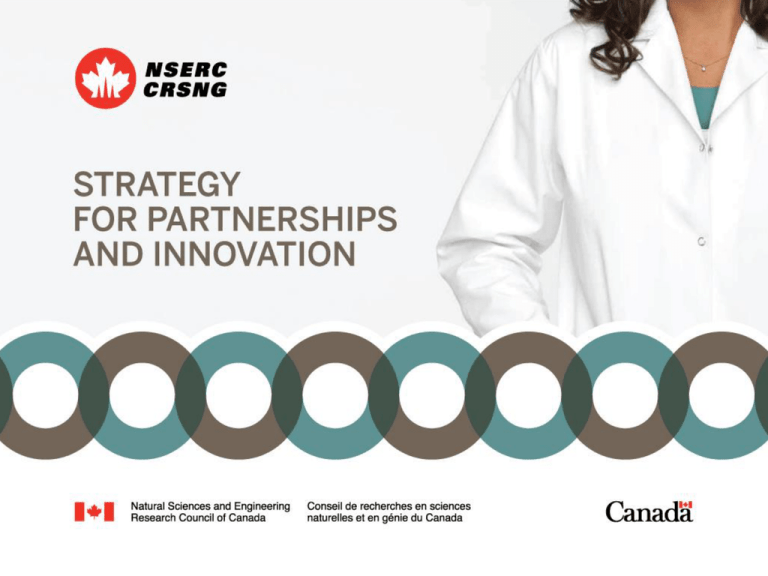
Strategy for Partnerships And Innovation University of Calgary, March 19, 2014 My Goals Today • Discuss Interaction, Engage, Engage Plus grants • Overview of CRD, Partnership Workshops • Answer questions Five Core Partnerships Programs Industry-Driven Collaborative R&D Program • Interaction • Engage • Engage Plus • Collaborative Research and Development (CRD) • Industrial Research Chairs • Partnership Workshops Grants Training in Industry Program • Industrial Postgraduate Scholarships • Industrial R&D Fellowships • Industrial Undergraduate Student Research Award Commercialization Program (I2I) College and Community Innovation Program • • • • • • Applied Research and Development Innovation Enhancement Technology Access Centres Applied Research Tools and Instruments College-University Idea to Innovation Industrial Research Chairs for Colleges Strategic Partnerships Program • • • • • • Strategic Networks Strategic Projects Automotive Partnership Canada Chairs in Design Engineering Innovation Frontiers Collaborative Health Research Projects (CHRP) Interaction Grants Allow university researchers to meet with Canadian companies to discuss potential collaboration • • • • Establish a new relationship Up to $5,000 Can cover academic travel and meeting costs Apply anytime; fast turn-around Engage Grants • Support new research partnerships between university researchers and Canadian companies • Short-term R&D projects that address a companyspecific problem • No company cash required; must provide in-kind • Six-month project, maximum grant of $25,000 Engage Grants - Applicant Eligibility • Applicant must be eligible to receive NSERC funding – assistant, associate or full professor at an eligible institution. • Must have received a peer-reviewed grant from a recognized granting agency in the last six years for research in a natural sciences or engineering field Applicant Eligibility (continued) • Researchers from a health-oriented faculty are only eligible for an Engage Grant if they have been awarded an NSERC Discovery Grant within the past six years • Candidates are limited to two Engage Grant awards per fiscal year (April 1st – March 31st) Industry Partner Eligibility • The industry partner must be a for-profit company that operates from a Canadian base • If the partner is a Canadian subsidiary of an international company, it must have a manufacturing and/or R&D operation in Canada • Start-ups must have been incorporated for at least one year Industry Partner Eligibility (continued) • The partner must demonstrate the capacity and intention to further develop and apply the results for the benefit of the Canadian economy • The company must be at “arm’s-length” from the applicant – no past or present relationship Eligibility: Proposed Research • The proposed research must be in a natural sciences or engineering field • The project must be aimed at solving the company-specific problem through the generation of new knowledge, or the application of existing knowledge in an innovative manner • Due to the focus on a problem specific to the company, and the short duration of this grant, any intellectual property (IP) arising from the project will belong to the company Eligibility: Proposed Research (continued) Proposals are not eligible for an Engage Grant if they: • • • • focus on the commercialization of a university invention provide routine analysis, or routine use of university equipment collect data without interpreting underlying mechanisms are principally associated with the acquisition and maintenance of scientific equipment NSERC and Health-Related Research Eligible for NSERC support: • Research in animal health and veterinary medicine • Research related to food components, nutraceuticals • Research to further our understanding of fundamental processes in humans • Research whose primary purpose is the development of monitoring and diagnostic technologies • Research whose major challenges lie in the NSE (materials science, engineering, computer science, chemistry, etc) Source: Science.gc.ca (“Selecting the Appropriate Federal Granting Agency”) NSERC and Health-Related Research Not eligible for NSERC support: • Research to develop vaccines, active pharmaceutical ingredients, or other therapeutic agents for human applications • Research focused on investigation/treatment of injuries or human performance • Research seeking to develop animal models of human diseases in order to study primarily the disease state, or treatments for injuries or diseases represented by the model • Applied research for disease treatment, diagnosis or prevention • Research involving clinical trials Engage Grant Application • • • • • Form 101 Personal Data Form 100 Letter of Support from the company Completed Form 183A from the company Submitted to the RSO/RGO and then to NSERC – The best way to ensure that your Engage Grant application is successful is to follow the instructions Engage Grant Instructions The Engage Grant Proposal • Different headings than those used for other NSERC applications: – Overview of the company-specific problem – Research project – Research competence – Contribution to the technology transfer – Benefit to Canada The Engage Grant Budget • Proposed project expenditures must conform to the Use of Grant Funds guidelines (part of the Tri-Agency Financial Administration Guide) • It is not a requirement to have grad students work on the project • Engage Grant funds cannot be used for: – Expenses related to publications and conferences – Travel expenses for company personnel Engage Grant Timeline • No deadline – apply anytime • Average turn-around time: 4 – 6 weeks • Success rate: ~ 90% Engage Plus Grants • Awarded to a researcher and company that previously collaborated on an Engage Grant project • Build on the results of the original Engage project • NSERC matches company cash up to a maximum of $12,500 • NSERC does not match any company cash the university requests as overhead Engage Plus Grants (continued) • Same application & review process as Engage • Six-month project • As with Engage, any new IP belongs to the company • Applications must be submitted within six months of the end of the original Engage project Collaborative Research and Development Grants (CRD) • One to five years duration, average is two-three years • Average grant is $55,000 per year, but can vary from $10,000/year to more than $400,000/year • Industry responsible for at least ½ projects costs and must exploit results • Flexible leverage: cash and in-kind — $1 cash + $1 eligible in-kind = $2 from NSERC • No fixed application deadlines; apply anytime CRD Decision Timelines • If requesting less than $150k/year: - Paper peer review - 3 to 4 months • If requesting $150K to $200K: - Paper peer review - Review by NSERC committee; meets four times/year - 4 to 6 months • If requesting more than $200,000/year - Site visit by peer review committee - ACUIG review - 4 to 6 months Partnerships Workshops Grants • Bring together academic researchers and industry • Workshop focused on research & technology needs identified by the non-academic community • Topic must fall within the natural sciences or engineering • Small, highly focused groups of 20 to 40 participants Partnerships Workshops Grants (continued) • Must include academic researchers from multiple Canadian universities • Must be focused on developing new academicindustry collaborations • Workshop must include an academic leader (applicant) and a non-academic leader Partnerships Workshops Grants (continued) • Award of up to $25,000 • Funds cover meeting costs and travel, accommodation of academic participants • No deadline; apply at least 60 days before planned workshop date For More Information… www.nserc-crsng.gc.ca www.nsercpartnerships.ca Questions? frank.nolan@nserc-crsng.gc.ca 435 Ellice Avenue, Suite 430 Winnipeg, Manitoba R3B 1Y6 204-984-0426 www.nserc-crsng.gc.ca
